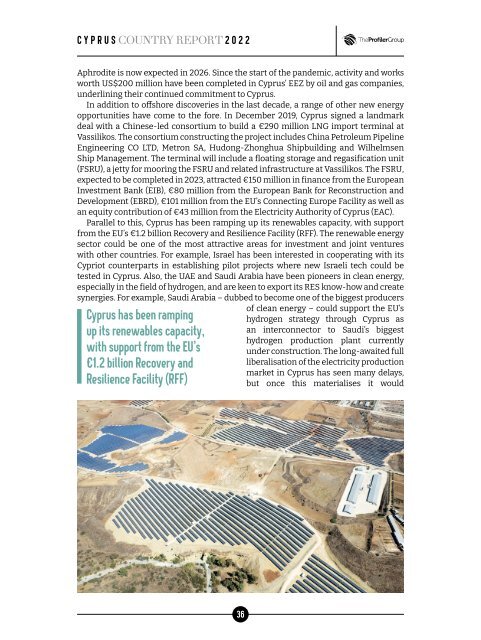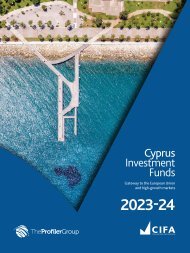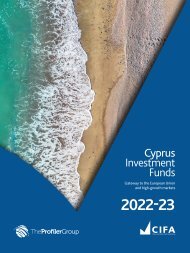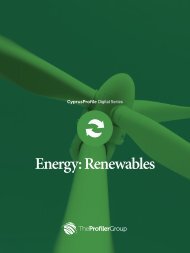2022-2023 Cyprus Country Report
You also want an ePaper? Increase the reach of your titles
YUMPU automatically turns print PDFs into web optimized ePapers that Google loves.
CYPRUSCOUNTRY REPORT <strong>2022</strong><br />
Aphrodite is now expected in 2026. Since the start of the pandemic, activity and works<br />
worth US$200 million have been completed in <strong>Cyprus</strong>’ EEZ by oil and gas companies,<br />
underlining their continued commitment to <strong>Cyprus</strong>.<br />
In addition to offshore discoveries in the last decade, a range of other new energy<br />
opportunities have come to the fore. In December 2019, <strong>Cyprus</strong> signed a landmark<br />
deal with a Chinese-led consortium to build a €290 million LNG import terminal at<br />
Vassilikos. The consortium constructing the project includes China Petroleum Pipeline<br />
Engineering CO LTD, Metron SA, Hudong-Zhonghua Shipbuilding and Wilhelmsen<br />
Ship Management. The terminal will include a floating storage and regasification unit<br />
(FSRU), a jetty for mooring the FSRU and related infrastructure at Vassilikos. The FSRU,<br />
expected to be completed in <strong>2023</strong>, attracted €150 million in finance from the European<br />
Investment Bank (EIB), €80 million from the European Bank for Reconstruction and<br />
Development (EBRD), €101 million from the EU’s Connecting Europe Facility as well as<br />
an equity contribution of €43 million from the Electricity Authority of <strong>Cyprus</strong> (EAC).<br />
Parallel to this, <strong>Cyprus</strong> has been ramping up its renewables capacity, with support<br />
from the EU’s €1.2 billion Recovery and Resilience Facility (RFF). The renewable energy<br />
sector could be one of the most attractive areas for investment and joint ventures<br />
with other countries. For example, Israel has been interested in cooperating with its<br />
Cypriot counterparts in establishing pilot projects where new Israeli tech could be<br />
tested in <strong>Cyprus</strong>. Also, the UAE and Saudi Arabia have been pioneers in clean energy,<br />
especially in the field of hydrogen, and are keen to export its RES know-how and create<br />
synergies. For example, Saudi Arabia – dubbed to become one of the biggest producers<br />
of clean energy – could support the EU’s<br />
hydrogen strategy through <strong>Cyprus</strong> as<br />
I<strong>Cyprus</strong> has been ramping<br />
up its renewables capacity,<br />
with support from the EU’s<br />
€1.2 billion Recovery and<br />
Resilience Facility (RFF)<br />
an interconnector to Saudi’s biggest<br />
hydrogen production plant currently<br />
under construction. The long-awaited full<br />
liberalisation of the electricity production<br />
market in <strong>Cyprus</strong> has seen many delays,<br />
but once this materialises it would<br />
36
















